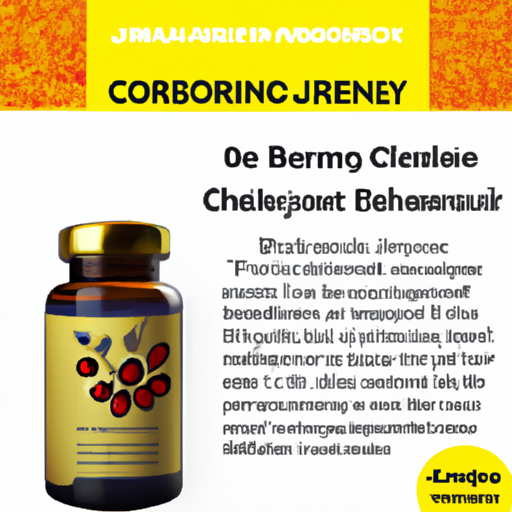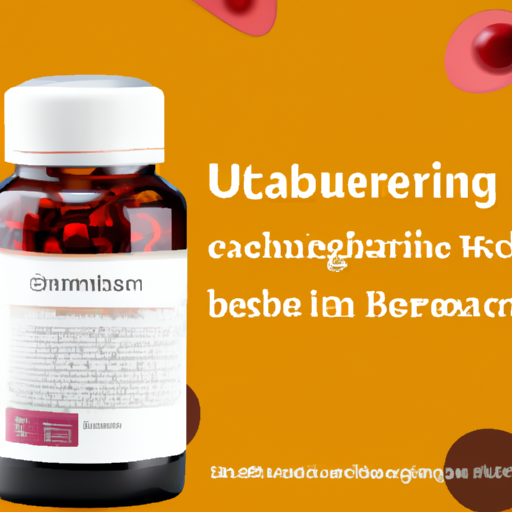If you’re curious about the most effective form of berberine, you’re not alone. Berberine, a natural health supplement derived from various plants, has been used for centuries for its potential health benefits. With properties like anti-inflammatory, antioxidant, and antimicrobial effects, berberine is most well-known for its impact on metabolic health. It has shown promising results in regulating blood sugar levels and reducing cholesterol, making it a popular choice for those with type 2 diabetes or insulin resistance. However, before incorporating berberine into your routine, it’s crucial to consult with a healthcare professional, as interactions with certain medications are possible. So, let’s explore the most effective form of berberine and its potential benefits.

What is berberine?
Berberine is a natural health supplement derived from various plants, including Berberis vulgaris (barberry), Berberis aristata (tree turmeric), and Coptis chinensis (goldthread). It has a long history of use in traditional Chinese medicine and Ayurvedic medicine due to its potential health benefits. Berberine is known for its wide range of properties, including anti-inflammatory, antioxidant, and antimicrobial effects. These properties make it a valuable compound with numerous potential health benefits.
Benefits of berberine
Anti-inflammatory effects
Berberine has been shown to possess anti-inflammatory effects, which may help mitigate chronic inflammation in the body. Chronic inflammation has been linked to various diseases, including cardiovascular disease, diabetes, and certain types of cancer. By reducing inflammation, berberine may contribute to overall health and well-being.
Antioxidant effects
Berberine is also recognized for its antioxidant properties. Antioxidants help combat oxidative stress caused by free radicals in the body. Oxidative stress can lead to cell damage and various health issues. By neutralizing free radicals, berberine may help protect cells from damage and support overall health.
Antimicrobial effects
Berberine exhibits potent antimicrobial activity, meaning that it can help fight against various types of harmful microorganisms, including bacteria, viruses, fungi, and parasites. This property may be particularly useful in supporting immune health and preventing or treating infections.
Metabolic health support
One of the most well-researched and prominent uses of berberine is in managing metabolic health. Studies have shown that berberine can help regulate blood sugar levels, making it potentially beneficial for individuals with type 2 diabetes or insulin resistance. By improving insulin sensitivity and glucose metabolism, berberine may help individuals maintain healthy blood sugar levels.
Regulating blood sugar levels
Berberine has been found to regulate blood sugar levels by increasing insulin sensitivity and promoting glucose uptake in cells. By enhancing the body’s response to insulin and improving glucose control, berberine may assist in managing and preventing complications associated with diabetes.
Reducing cholesterol levels
Berberine has also been shown to reduce total cholesterol levels and LDL cholesterol levels. High cholesterol levels are a risk factor for cardiovascular disease, and by lowering cholesterol, berberine may contribute to improved cardiovascular health.
Managing blood sugar levels
Effects on type 2 diabetes
Research suggests that berberine can effectively lower blood sugar levels in individuals with type 2 diabetes. It works by activating an enzyme called AMP-activated protein kinase (AMPK), which plays a crucial role in regulating glucose metabolism. Berberine’s ability to regulate blood sugar levels makes it a promising supplement for individuals with type 2 diabetes.
Effects on insulin resistance
Insulin resistance is a condition characterized by the body’s decreased response to insulin. Berberine has been shown to enhance insulin sensitivity, making it easier for cells to respond to insulin and effectively regulate blood sugar levels. By addressing insulin resistance, berberine may help individuals manage their blood sugar levels more effectively.
Improving cardiovascular health
Reducing total cholesterol levels
High levels of total cholesterol in the blood can contribute to the development of cardiovascular disease. Berberine has been shown to effectively reduce total cholesterol levels, thereby potentially reducing the risk of heart disease and improving overall cardiovascular health.
Reducing LDL cholesterol levels
LDL cholesterol, also known as “bad” cholesterol, is a major risk factor for heart disease. Studies have demonstrated that berberine can lower LDL cholesterol levels, which is crucial for maintaining a healthy cardiovascular system. By reducing LDL cholesterol, berberine may help prevent the formation of plaque in the arteries and reduce the likelihood of heart-related complications.

Popularity of berberine as a supplement
Supporting overall metabolic health
Due to its positive effects on blood sugar regulation and cholesterol reduction, berberine has gained popularity as a natural supplement for supporting overall metabolic health. It serves as a complementary approach to traditional treatment methods for conditions such as type 2 diabetes and insulin resistance.
Consulting with a healthcare professional
As with any supplement, it is important to consult with a healthcare professional before starting berberine. They can evaluate your individual health needs and determine if berberine is a suitable addition to your wellness routine. Additionally, healthcare professionals can provide guidance on proper dosage, potential interactions with other medications, and address any concerns you may have.
Different forms of berberine
Berberine hydrochloride
Berberine hydrochloride is one of the most common forms of berberine available in supplement form. It is highly absorbable and has been extensively researched. Berberine hydrochloride is often recommended due to its bioavailability and effectiveness in managing blood sugar levels and reducing cholesterol.
Berberine sulfate
Berberine sulfate is another form of berberine that is used in supplements. It has similar properties to berberine hydrochloride and has been studied for its potential health benefits. However, more research is needed to determine if there are any significant differences between the two forms in terms of effectiveness.
Berberine phytosome
Berberine phytosome is a form of berberine that is combined with phospholipids to improve absorption and bioavailability. This formulation allows berberine to be more easily absorbed by the body, potentially enhancing its efficacy. Berberine phytosome offers a promising option for individuals who may have difficulty absorbing traditional forms of berberine.
Berberine complex
Berberine complex refers to a combination of berberine with other compounds that may enhance its effects. This form of berberine may have additional ingredients such as coenzyme Q10 or resveratrol, which are known for their antioxidant and heart-healthy properties. Berberine complex offers a comprehensive approach to supporting metabolic health.

Effectiveness of berberine hydrochloride
Scientific research and studies
Berberine hydrochloride has been extensively studied for its effectiveness in managing blood sugar levels and reducing cholesterol. Numerous scientific studies have demonstrated its ability to improve insulin sensitivity, regulate glucose metabolism, and lower LDL cholesterol levels. These findings support the potential efficacy of berberine hydrochloride as a supplement for metabolic health.
Blood sugar regulation
Research suggests that berberine hydrochloride can effectively lower blood sugar levels in individuals with type 2 diabetes. It works by activating AMPK, a key enzyme involved in glucose metabolism. By enhancing insulin sensitivity and promoting glucose uptake, berberine hydrochloride helps regulate blood sugar levels and manage diabetes-related complications.
Cholesterol reduction
Berberine hydrochloride has also shown promise in reducing cholesterol levels, both total cholesterol and LDL cholesterol. This effect may be attributed to berberine’s ability to inhibit cholesterol synthesis and enhance the clearance of LDL cholesterol from the bloodstream. By addressing high cholesterol levels, berberine hydrochloride supports cardiovascular health.
Effectiveness of berberine sulfate
Comparison to berberine hydrochloride
Berberine sulfate is a less commonly studied form of berberine. While it shares similar properties with berberine hydrochloride, there is limited research directly comparing the effectiveness of the two forms. Therefore, more studies are needed to determine if there are any significant differences between berberine sulfate and berberine hydrochloride in terms of their health benefits.
Clinical trials and findings
Although there is limited research specifically focusing on berberine sulfate, some clinical trials have investigated the effects of berberine in general. These trials have shown promising outcomes in terms of blood sugar regulation and cholesterol reduction. While it is not clear if berberine sulfate offers distinct advantages over other forms, these preliminary findings highlight the potential effectiveness of berberine in managing metabolic health.

Effectiveness of berberine phytosome
Enhanced bioavailability
Berberine phytosome offers a potential solution for individuals who struggle with the absorption of traditional berberine forms. By combining berberine with phospholipids, the bioavailability of berberine is enhanced, allowing for better absorption by the body. Improved bioavailability may contribute to increased effectiveness in managing blood sugar levels and reducing cholesterol.
Improved absorption
One of the primary advantages of berberine phytosome is its improved absorption. Traditional forms of berberine may have low absorption rates, requiring higher dosages for optimal effectiveness. Berberine phytosome addresses this issue by increasing absorption and allowing for lower dosages without compromising efficacy. This improved absorption may make berberine phytosome a desirable option for individuals seeking maximum benefits with lower dosage requirements.
Conclusion
When it comes to determining the most effective form of berberine, there is no definitive answer. The effectiveness of different forms may vary depending on the individual and their specific health needs. It is essential to consider personal preferences, consult with a healthcare professional, and carefully evaluate scientific research and studies. Remember, individual responses to berberine supplementation may also vary. By approaching berberine with an informed and personalized perspective, you can make the best decision for your health and well-being.








